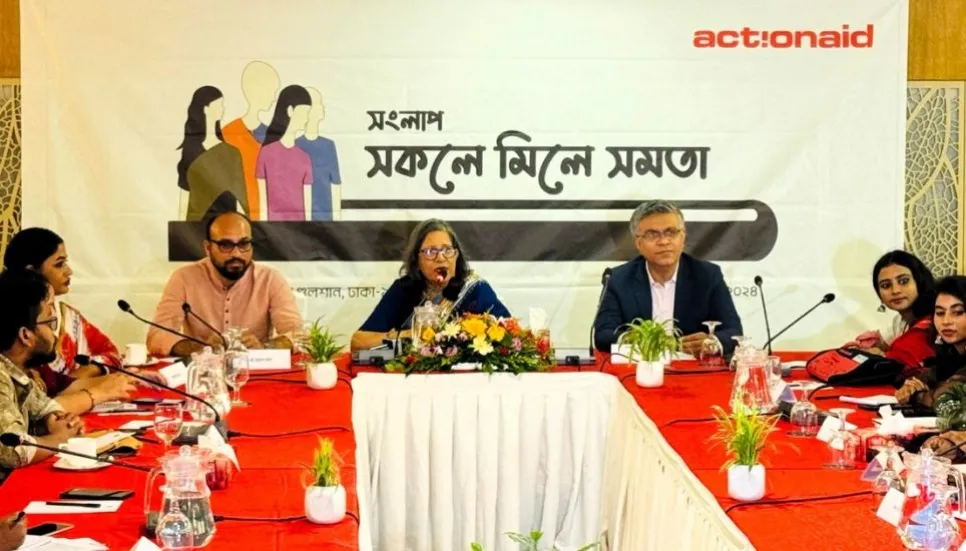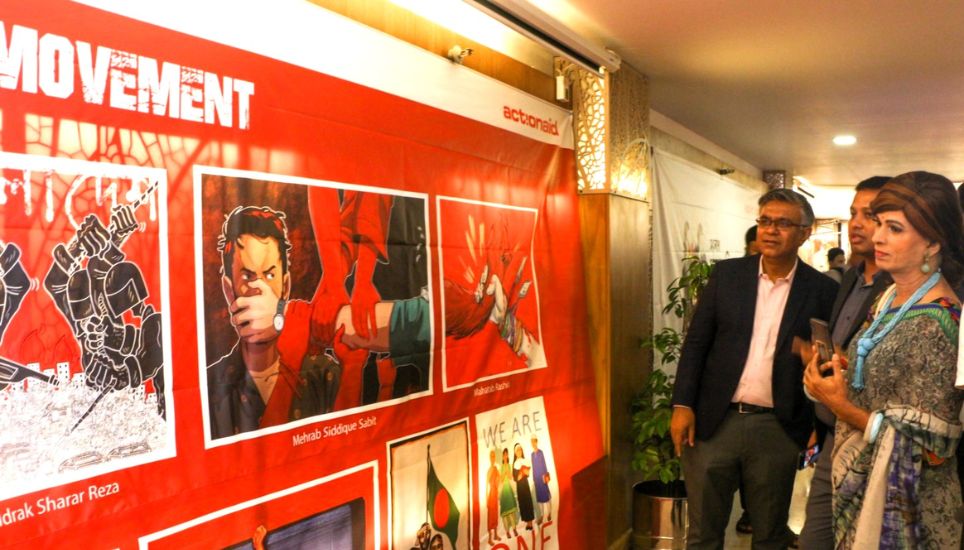
The recent student-led movement has opened new avenues for state reform and reconstruction. Building an inclusive and equitable society has emerged as a new challenge for the newly formed interim government.
This journey of state reform must prioritise the demands of marginalised communities at the grassroots level. To build a non-discriminatory, inclusive, gender-sensitive, and just state, the effective inclusion of women in national development, the creation of a conducive work environment including disability-friendly government services, ensuring the safety of Dalit-Harijan, and sex worker communities, and addressing the aspirations and challenges of indigenous peoples are important.
This call was made at a dialogue organised by ActionAid Bangladesh in Gulshan, Dhaka, on Monday, reads a press release.
The theme of the dialogue was “Anti-Discrimination for Inclusion.”
The dialogue was attended by over 20 representatives from different sectors including indigenous communities, persons with disabilities, sex workers' rights activists, youth and women's rights activists, anti-discrimination movement coordinators, climate activists, media personalities, Dalit-Harijan communities, and other marginalised groups.
The dialogue began with a minute of silence in memory of those who lost their lives during the student-led uprising. Representatives from various sectors shared their experiences and aspirations for state reform.
Nishitha Zaman Niha, a coordinator of the anti-discrimination movement, said, "We, the students and the people, stood against a discriminatory system. Although we have temporarily achieved freedom, we cannot celebrate yet because discrimination still exists in various sectors of our country. Reforms are still needed to ensure the rights of all citizens."
Puchainu Marma, a representative of the Indigenous community, said, "Quality education and healthcare are inadequate in the Chittagong Hill Tracts. Although a lot of money has been spent on infrastructure, services are still inadequate. Moreover, unless the land issues in the CHT regions are resolved, the problems we face will not be solved."
Mehedi Hasan, a representative of the disability community, said, "Comprehensive rehabilitation of people with disabilities, especially during floods and other natural disasters, is crucial. The selection process for disability allowances under the social safety net program needs to be transparent, and the amount of aid should be increased."

Nilofa, General Secretary of the Sex Workers' Network, said, "We demand justice for sex workers. We are facing mental and physical violence, and we want safety and the rule of law. We want the perpetrators to be brought to justice."
Abida Sultana Akhi, a youth and women's rights activist, said, "The provision of gender-responsive government services needs to be expanded. Women still face challenges in accessing services equitably. We want an equitable society."
Anowara Begum, a representative of women farmers, said, "Women farmers do not have their land, and they still face wage discrimination. They have limited access to local markets for their businesses, and sanitation facilities are inadequate. We want a discrimination-free society for women farmers. I want all women farmers to have a 'farmer's card' as an identity to access services and benefits."
Azmeri Haque Badhon, a media personality, said, "I want reforms in guardianship and inheritance laws to ensure there is no discrimination and that the laws are in line with current needs. I want all parents to teach their children how to assert their rights and how to ensure the rights of others."
Responding to a question about the relevance of this dialogue during the interim government's time of challenges, Farah Kabir, Country Director of ActionAid Bangladesh and moderator of the dialogue, said, "This is the time for planning. There is a lot of constructive thinking and planning going on in the government in multiple sectors. If we don't discuss the issues of discrimination now, there is a concern that some people may be left behind in this reform journey. We must remember that the interim government has limitations, but we cannot forget the demands of the grassroots. We are working with young people to build a discrimination-free society."
Ibrahim Khalil Al Zayad, Chairperson of ActionAid International Bangladesh Society, said, "We are now going through constitutional reforms. The issue of discrimination must be considered. The interim government may not be able to do everything overnight, but they must make a promising start. And that start must be inclusive. So that in the future, with young people in the lead, all reform activities can be carried out in a non-discriminatory manner."
The dialogue was inaugurated by Kazi Morshed Alam, Head of Program and Engagement at ActionAid Bangladesh. Other speakers included women's rights activist Dalia Islam, transgender community representative Ivan Ahmed Kotha, Dalit-Harijan community representative Khillon Robi Dash, child rights representative Bithi Akter, women's rights activist Zinia Afrin Smriti, garment worker Bilkis, climate activist Sohanur Rahman, and Morium Nesa, Manager of Women's Rights and Gender Equity at ActionAid Bangladesh.
At the end of the dialogue, the guests visited a special cartoon and art exhibition themed around the student-led uprising.